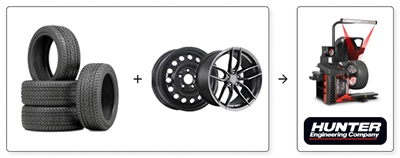Brake maintenance is an investment!

Can we prevent brake wear?
If you don't brake hard and perform regular inspections of your brakes, you'll be able to prevent premature wear and extend the life of your tires and brakes while saving money and fuel!
A few drops of lubricant will save you a lot of money!
During the cold season, our brakes are under more stress than ever. Add to that calcium and salt, and your braking system may need special attention come spring. To avoid premature wear and tear and all the consequences, knowing a little about your brakes and the proper way to maintain them is essential.
What are the brake parts?
A vehicle's braking system consists of several mechanical parts that, when properly maintained, provide optimal braking performance. The booster, master cylinder, brake fluid, line, callipers, discs, and pads are the system's main components.
All the parts are connected: when you step on the brake pedal, the pressure from your foot is transmitted to the master cylinder, which disperses brake fluid into the line. This deploys the brake pads against the discs, and the friction between these two components causes the vehicle to slow down until it is fully braked.
The discs and pads are the most likely to wear out quickly because they are constantly subjected to robust and recurring friction.
Why and when should I have my brakes checked?
A sound braking system is essential for safe driving. That's why it's essential to make sure your brakes are working properly. Plus, maintaining your brakes will save you money in the end because you'll have to change them less often.
It is recommended that you have your brakes serviced at least once a year, preferably every six months. It makes sense to do it simultaneously by changing your tires (in the fall and spring), as the brake system components are much more accessible without the wheels!
It is important to note that owners of performance cars, commercial vehicles, and those often on the road should have their brakes inspected more regularly, every three months.
Any signs or symptoms of brake wear?
There are a few signs that may alert you to the condition of your braking system.
First, if you hear a loud or metallic sound when you step on the brake pedal, your pads are likely worn.
If your braking distances have increased, it's also a sign that your brakes are worn. Also, if your brake pedal doesn't offer as much resistance or if the pedal drops lower than usual, it's a good idea to have your braking system inspected.
Also, if you feel a vibration when you brake, you probably have a brake failure.
Finally, if a warning light comes on in your dashboard, whether it's for the brakes or the ABS, you should go to a mechanic shop to investigate the source of the signal.
What does my mechanic do when he services my brakes?
When you visit a garage to have your brakes serviced, the technician will first visually inspect the various components. For the brake pads, it is the thickness that your mechanic checks: new pads are more or less 10 mm thick, and they must be replaced when they reach 2 mm. It would be best if you changed the discs simultaneously as the pads to have an optimal braking surface.
Next, your mechanic should lightly grease the calliper guides and the contact surfaces between the pads. The purpose of this lubrication is to avoid blocking, often due to rust. If they do, the constant friction between the pads and the discs causes premature wear of these parts and excessive fuel consumption.
Can brake wear be prevented?
Besides adopting a less aggressive driving style and washing your vehicle, it is also possible to clean the discs of your brakes yourself to prevent their wear and improve braking efficiency. The salt and calcium on the roads in the winter make exposed brake parts hard to live with and cause them to rust.
That being said, to clean the discs, it is essential to use the appropriate product, i.e. brake cleaner, available in big box stores for about ten dollars. Take advantage of a time when your wheels are not on your vehicle, such as when you change your tires to clean your brakes. Spray the fluid on the discs, wait a few seconds, then wipe off the excess with a clean cloth. Be careful not to put any product (very corrosive) on the paint or rubber not to damage them.
So, especially in the spring, when you do your spring cleaning, take the time to clean your brakes well to avoid corrosion.


